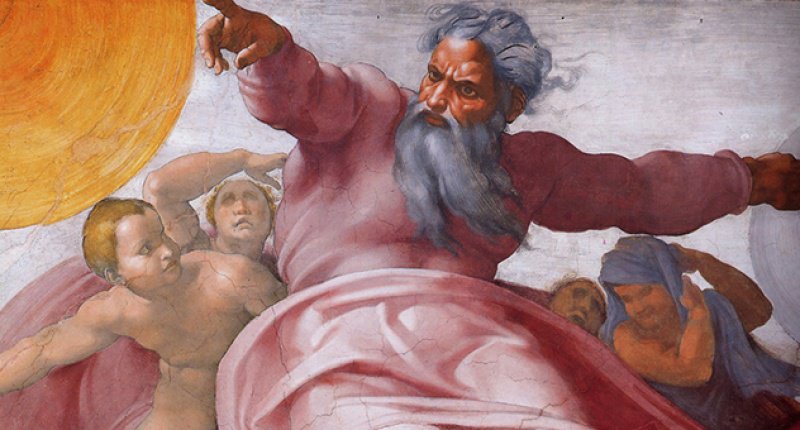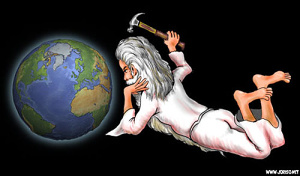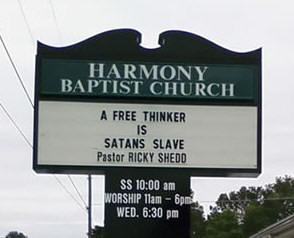| By: Paul S. Cilwa | Viewed: 4/24/2024 Posted: 7/24/2006 Updated: 5/16/2017 |
Page Views: 5430 | |
| Topics: #Spirituality #ReligiousPolitics | |||
| Let's examine the connection between abused children and their need as adults to rely on an Authority figure to give their lives meaning. | |||

I believe in God. So does my co-worker, Ben. But the similarity ends there; because the god Ben believes in is as different as the God I believe in, as is possible. (Yes, I admit it—I'm capitalizing my God, and not Ben's, to help distinguish them. Really, that's the only reason.)
Ben's god seems to have come from the pages of the Old Testament. Like Jehovah, Ben's god takes sides (He prefers America to Iraq), smites those who offend him (both the 9-11 attacks and the tsunami of a few days ago were "proof" of this), and rewards those who shower him with devotion and admiration. Ben's god is definitely a "person" with a specific personality, likes and dislikes, and, of course, Absolute Power. He thinks nothing of condemning those who fail to meet his standards in this life with an eternity in Hell, no possibility of parole, no Get Out Of Jail Free card. His rewards are equally lavish, though, oddly, less well-defined.
My God is not a person. For me, God is the Universe and the multiverse that contains it. There is a plan but it isn't very personal—death is as much a part of it as birth and rebirth, and the afterlife just as significant. I see God as holographic; every part of the Universe is a part of God, and the Whole of God can be seen in each part—and, as a part of the Universe, that includes me. Therefore, I can say "I am God" with the understanding that, so are you—and so is my chair, and my computer keyboard, and the fly buzzing around my desk…and Ben. As a multidimensional entity, I can best reach God by looking deeply within; and, paradoxically (though it makes perfect sense with multidimensional mathematics) by looking deeply enough I can experience Oneness with all God's other Universal components.
Ben's god can't really be disproved because, unlike a scientific theory, Ben's god comes with no evidence. I can't prove the Flying Purple People Eater isn't real, either, for the same reason. Still, the appeal of a vicious, vengeful god has been lost on most modern audiences (the exceptions being those who've been raised in authoritarian homes, and, in a new study, those who have brain damage).
By the same token, my God can't be disproved either. But that's okay, because I make no claims for it other than that which can be directly experienced. To deny my God is to deny the existence of the Universe, of quantum physics, of the reappearance of fractals in all of nature, of the well-recorded transcendent experiences so many people of varying beliefs, including atheism, share.

But in that case, why does Ben—or anyone else—believe in such a god, a god who is no more than the glorification of a typical abusive parent?
And why do atheists so enthusiastically bother to deny him?
Alice Miller, an author with a PhD in philosophy, psychology and sociology, as well as a researcher on childhood, has come up with a theory which rings true. She's done a great deal of research on what kind of person adores a brutal, abusive god yet insists that such a god is "good". And it turns out—always—that such a person is the child of a brutal, abusive parent.
So it shouldn't be a surprise when worshippers refer to this Jehovian god as "Father".
Abuse doesn't have to consist of physical mistreatment. As Dr. Miller points out,
Humiliations, spankings and beatings, slaps in the face, betrayal, sexual exploitation, derision, neglect, etc. are all forms of mistreatment, because they injure the integrity and dignity of a child, even if their consequences are not visible right away.
Her original studies were in the field of finding out what makes a murderer a murderer. There seemed to be no common cause until she began examining their childhoods. But then she stumbled on two facts that showed a statistically significant relationship, in spite of their seeming paradox:
Murderers were abused as children.
Murderers were either devoutly religious, or devoutly atheistic—never in between.
As she continued her investigations, she theorized that, as an abused child grows, his or her need for an authority figure increases. Eventually, the actual domineering parent cannot fill the need; so the child turns to a superhuman figure—a domineering god—for guidance.

Because that's the key: These people cannot think for themselves. As children, they were punished when they tried. Like Pavlov's dog salivating when a bell rings, these people cringe at the thought of thinking independently. They require the approval of a group, such as their church or a named political party or a charismatic president or a self-described "jealous god."
They can never perceive themselves as independent, self-actualized people—indeed, they can't even grasp the concept. When asked, they might define themselves as "a child of God" — but never as "God's co-creator."
That much responsibility terrifies them.
How about people who are not murderers? —For surely, not every child of an authoritative parent becomes one.
Well, it's not all nurture—some of it is nature. From a physical standpoint, certainly some people just have a genetic predilection to perceive themselves as whole persons in all but the most brutal of environments. And from my view as a reincarnationist, I can see where some people come into a new life with enough confidence to resist all but those worst.
Still, you don't have to be a murderer to abuse your own child, in just the way you were abused.
And is it really not murder to support an unjust war, or even a "just" war?
One of the most perplexing issues faced by people is how a "Christian" can claim to accept the teachings of a man who said to turn the other cheek to an enemy who smites you, and then invade and destroy a country in his name! —But the understanding that abused children grow up to be abusive and religious allows this apparent paradox to be seen as parts of the same, cohesive whole. After all, God as an authority doesn't in fact exist; so people who "accept" God as an authority are really just accepting the authority of someone claiming to speak for God—as many abusive parents do, and as more than one politician has done.
Asking "Who would Jesus bomb?" doesn't faze these people, because they simply don't understand the irony of the question. For them, the answer is, "Whoever defies Him." Because these people simply cannot discern the difference between one authority and another (which is why they so often confuse Jesus with God the Father) and that makes god equivalent to Daddy, whose punishment for any transgression, real or imagined, was so swift and overwhelming.
What about the case of the devout atheist—who is the authority figure for such a person? Why, 18th-century science of course! By clinging to the certainties asserted by the last crop of scientists before quantum physics re-opened the known Universe to the wonders of indeterminism and the ambiguous experiences of intuition and psychic awareness, these worshippers of the Clockwork Universe still get to know the rules and face the punishment that will surely come if they are broken. Global Warming is, for them, the hell the god of Science will mete out to those who follow the false god of Climate Change Denial.
(That climate change is real is not the point of that paragraph.)
The key to recognizing these people—or to recognizing these traits in yourself—is in learning to spot the either-or paradigm. Either you accept Jesus as your personal savior, or you burn in hell forever. Either you accept that we must impeach Trump, or the Earth will be destroyed. There's never any room for doubt, no leeway for muddling through.
There's never any room for questioning.
But what if you were abused as a child, yet have not fallen into the needs-an-authority-figure trap? According to Dr. Miller,
…when I tried to expose the social consequences of child abuse, I encountered fierce resistance. Repeatedly I was told, "I, too, was a battered child, but that didn't make me a criminal." When I asked for details about their childhood, I was always told of a person who loved them, but was unable to protect them. Yet through his or her presence, this person gave them a notion of trust, and of love. I call these persons helping witnesses.
Dr. Miller goes on to describe "enlightened witnesses," people who can help a former victim of abuse find wholeness through listening to his or her story and providing a context for it. Without either a helping witness or an enlightened witness, a person will retain the childhood-induced fantasy that his or her abusive parent was "good," "perfect," "right." Every childhood attack will be seen as the child's just due for his or her disobedience, stupidity, inadequacy—anything to prevent the adult from acknowledging the parent's faults. Compare this to the healthy adult, who can acknowledge that his or her parents were imperfect people who did, or didn't, always do the best they could with what they had—and love them anyway.
The actualized adult sees his parents as, simply, other adults with whom they may or may not wish to be friends. The abused child-as-adult can never see his or her parents as anything but authorities who "know better."
Arthur Silber observed an example of this in an interview Diane Sawyer did with Mel Gibson:
Gibson said, several times: "Diane, he's my father. My father. My father."
And the way Gibson said it clearly conveyed that his father, his father's goodness, the fact that his father was worthy of deep admiration, and —above all— his father's authority were not to be questioned; all of these were immutable facts, absolutes beyond all debate or questioning.
Gibson's inability to question his father extended to his acceptance of his father's belief that the Holocaust never occurred, and that the Jews were, in fact, responsible for the crucifixion of Jesus—in spite of all evidence to the contrary.
Gibson simply couldn't hear the evidence. Like other abused children-as-adults, the moment a conflict comes up between what the accepted authority says and reality, the authority wins out every time.
No wonder the Bible tells us that to "spare the rod" is to "spoil the child." That's the only way it can maintain its power! —Because it is far too filled with internal inconsistencies to convince anyone of its divinity in any way other than as unquestioned authority.
So, now we know the difference between the 30%-40% of the population who still support Bush and his failed war and who still do not question his lies—and the rest of us. Same for that fast-diminishing set of Trump supporters about the same percentage of the population, which actually proves the validity of the premise.
Were these supporters of presidential pretenders all abused as children, without either helping witnesses at the time or enlightened witnesses to assist later? (And I can guarantee none of them have succeeded in reading this far!) I can only promise that, like Mel Gibson, there will be adult survivors of abuse who still think their childhood was "normal."

I propose that we are doomed to fail if we focus on trying to enlighten these unactualized people with facts and figures. They can't hear anything that contradicts the words of their accepted authority figure, the president who talks to Jesus in between "grabbing women by the pussy". But we might have some luck if each one of us adopts a conservative and volunteers to be an enlightened witness for him or her. Ask about his or her upbringing. Lead the topic to the way he or she was abused. And help them to see they didn't deserve it; that it wasn't their fault.
When they begin to see their parents for the violent abusers they really were, their healing, and ours, in the present can begin.
I'll start with Ben.





